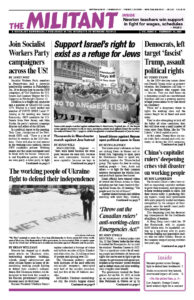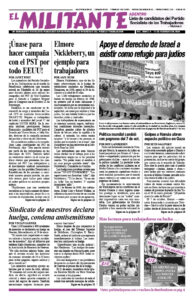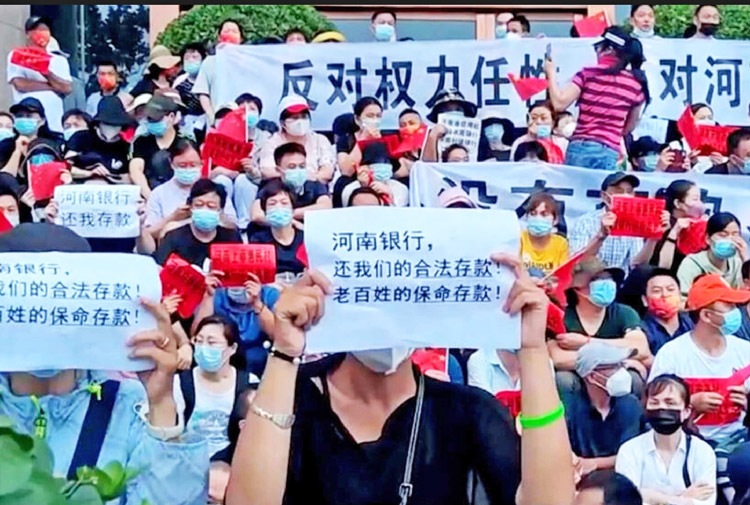For decades China’s rulers have relied on expanding capitalist methods to grow their economy, and repression to keep working people in check. But their course today is producing falling exports, rising local government debt and a property market meltdown, exemplified by the collapse of Evergrande, once the world’s most profitable property developer.
This deepening crisis has devastating consequences for the livelihoods of millions of workers.
A Hong Kong court ruled Jan. 29 that Evergrande, with its gigantic $300 billion debt, be liquidated, setting up a tug-of-war over its assets between Beijing and imperialist lenders who are owed billions. Bosses at the company stopped paying creditors two years ago.
Evergrande’s rise from the late 1990s was powered by the biggest property bubble the world has ever known, as investors sought to profit from the demand for housing for tens of millions flooding into the cities from rural areas during China’s rapid industrialization. Huge profits were raked in by Evergrande’s owners, who have close ties to the ruling Chinese Communist Party, and by local governments that sold Evergrande land, and by banks in the U.S. and other imperialist countries that lent it money.
The company took billions in down payments for houses that were never built, and its collapse left countless numbers of construction workers with unpaid wages.
A two-year slump in China’s real estate sector, a quarter of the country’s economy, is threatening to provoke a crisis in the country’s banking system. Over 50 property developers have toppled under the weight of massive debts, while sales of new houses and house prices have plunged.
Today there are over 50 uninhabited “ghost” cities with abandoned towers containing 20 million units across the country.
Protests follow property crash
Thousands of protests over losses from the property crash have taken place. Some are by suppliers or contractors who have gone unpaid for months, others by construction workers who face layoffs. Millions of people have also vented their anger after losing life savings on deposits for homes never completed.
In industry, bosses’ profits fell 2.3% last year, after a 4% fall the year before. The world’s second-largest economy remains heavily dependent on exports. These fell in 2023, a result of slowing global demand.
High unemployment among Chinese university graduates — one in five without a job — has been “solved” by Beijing. When unemployment for 16 to 24 year olds hit 21.3% last summer the government simply stopped publishing the figures! Likewise, it has suppressed news that almost one billion people live on less than $300 a month. But the conditions that are driving more workers to find ways to stand up for themselves remain.
Young workers face growing difficulties starting families. Despite government inducements to have children, including tax breaks, cheap housing and cash payments, the birth rate fell in 2023 for the seventh straight year.
Foreign capitalists are shifting manufacturing from China to countries like Vietnam where bosses pay workers less. Amid sharpening competition for markets, war in Ukraine and Israel’s efforts to prevent further pogroms by Hamas, China’s rulers are deepening ties with the regimes in Russia, Iran and North Korea that increasingly confront Washington.
Chinese President Xi Jingping’s signature project, the Belt and Road Initiative, is losing steam. This worldwide program of loans and construction projects aims to advance Chinese capitalists’ influence worldwide. But governments that have borrowed from Beijing are defaulting on loans. The rulers in Italy, one of the few imperialist powers to sign up to the Belt and Road plan, pulled out of the scheme Dec. 6.
For years, Beijing has detained millions of Uighurs, a Turkic-speaking Muslim minority, in “reeducation camps” across Xinjiang province. Authorities have recently begun destroying or converting thousands of their mosques and other holy sites.
But when protests by working people elsewhere spread in November 2022 against Beijing’s brutal pandemic lockdowns, many participants expressed support for the Uighurs. The slogan, “We are all Xinjiang people,” appeared at protests, cutting across the regime’s attempts to bolster Han-Chinese nationalism and divide working people.
Demonstrations by workers have grown recently in China’s export-oriented manufacturing industries where demand has fallen. More than 1,700 strikes took place last year, double the number in 2022. They are protesting unpaid wages and benefits, as well as mass layoffs or forced relocations.
Over 1,000 workers went on strike at the Baoyi shoe company in Jiangsu province Nov. 29-Dec. 7, demanding full compensation for the factory’s closure after the company’s owners shifted production to Indonesia.
According to the Hong-Kong based China Labor Bulletin, the bosses ran down the size of the workforce to circumvent China’s labor laws and avoid paying into social security and housing funds.
While Beijing’s conflicts with Washington are sharpening, its biggest fear is the fighting capacities of billions of workers seeking ways to defend themselves from worsening conditions produced by the capitalist methods the Chinese rulers embrace.


